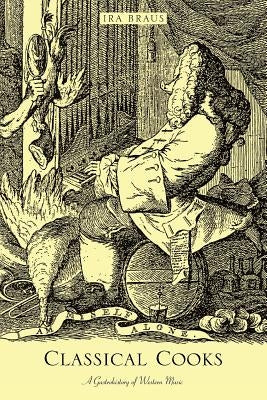Description
CLASSICAL COOKS: A GASTROHISTORY OF WESTERN MUSIC by Ira Braus The expression, "Classical music is an acquired taste" takes on new meaning in Ira Braus's Classical Cooks: A Gastrohistory of Western Music. Unlike most classical music guides, Classical Cooks links music and food synaesthetically. Synaesthesia means experiencing one sense modality by stimulating another, such as "hearing" colors. Music and food, as my book shows, are close enough aesthetically, so that we can enjoy them synaesthetically. The book correlates the respective musical and culinary talents of composers living between 1350 and 2000; it also suggests ways for listeners to distinguish composers' styles by way of gastro-musical association. Classical Cooks complements a recent line of books dealing with food and culture, e.g., The Toulouse Lautrec Cookbook, Keats's Porridge, and Jazz Cooks. To be sure, American orchestras, like the Boston Symphony and New York Philharmonic, have published recipes contributed by their players. But no substantial anthology of composer recipes has thus far appeared. Classical Cooks has Three Courses, plus Dessert. Course 1, "Why Musicians Love to Talk Shop in the Kitchen," matches food categories with musical ones. Take fat. Musicians associate fat with lush, full-bodied orchestration as we hear in, say, Hollywood scores of the 1950s. These composers learned their craft from lipid composers like Puccini and Debussy. Puccini's "fat," mellifluous as it is, may be compared to olive oil - clear, fruity, digestible, while Debussy's is voluptuous, like butter - filmy, artery-clogging, and delectable. Course 2, "A Gastrohistory of Music in Documents" offers accounts of composers as gastro- nomes. Beethoven's culinary disasters are juxtaposed with Rossini's haute cuisine, so haute in fact, that one of his recipes ("Tournedos Rossini") appears in Larousse Gastronomique. One also reads stories of Liszt's food-fights with his pupils and of his chiding the American pianist, Amy Fay, for "making an omelette" when playing wrist-bending passages in his piano music. Course 3, "You Eat What you Compose, or, Will the Real Mozart Please Stand Up?" addresses riddles of music history: how knowledge of Mozart's favorite foods -- liver dumplings and sauerkraut -- might revise his popular image as a composer of "sweet" music, e.g. Eine kleine Nachtmusik; how a gastronomic kinship between J.S. Bach and Brahms -- their love of herring -- might reflect their dense musical expression, as well as Brahms's composing minuets and sarabandes during the mid-1800s; and how knowing Ravel's preference for "hot" food helps us to distinguish the sound of his music from the more understated style of Debussy. Dessert comprises "The Well-Tempered Cuisinier: Twenty-four Pastries and Foods from the Classical Cooks." Readers will find here a combination of recipes and menus suitable for diverse musical occasions (concert receptions, composer birthdays, opera caf entre s).
Author: Ira Braus
Publisher: Xlibris
Published: 02/19/2007
Pages: 192
Binding Type: Paperback
Weight: 0.64lbs
Size: 9.00h x 6.00w x 0.44d
ISBN13: 9781599269788
ISBN10: 1599269783
BISAC Categories:
- Music | History & Criticism | General
- Art | History | General
- Music | Instruction & Study | Theory
Author: Ira Braus
Publisher: Xlibris
Published: 02/19/2007
Pages: 192
Binding Type: Paperback
Weight: 0.64lbs
Size: 9.00h x 6.00w x 0.44d
ISBN13: 9781599269788
ISBN10: 1599269783
BISAC Categories:
- Music | History & Criticism | General
- Art | History | General
- Music | Instruction & Study | Theory
This title is not returnable

